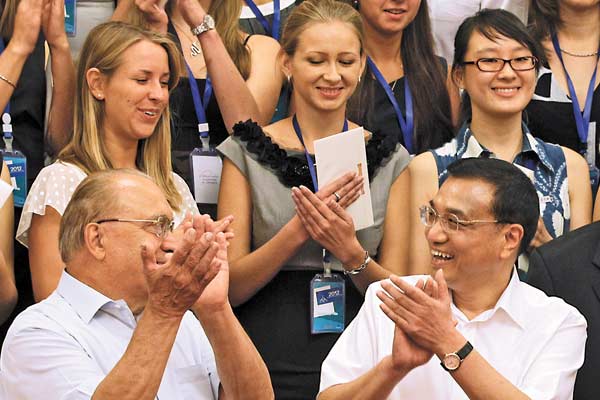Youth 'new hope of peace, growth'
Updated: 2012-08-25 01:30
By WANG HUAZHONG, DING QINGFEN and ZHANG YUNBI (China Daily)
|
||||||||
Vice-Premier Li: Young people are ambassadors of China-Russia ties
The youth of China and Russia should shoulder the responsibility of maintaining the world's peace and development, Vice-Premier Li Keqiang said on Friday.
|
 Vice-Premier Li Keqiang shares a happy moment with visiting teachers and students from Moscow State University in Beijing on Friday. Wu Zhiyi / China Daily |
"Enhanced cooperation and friendship between China and Russia will do good to people from both countries, and be helpful to world peace," he said during his meeting with a Russian delegation of 300 students from Moscow State University in Beijing.
Li's remarks were made as the international community watches the duo play a more active and decisive role in shaping the world's agenda.
"I expect the youth in both countries to act as the next new generation responsible for safeguarding peace and development worldwide," Li said, calling them "ambassadors and the future of bilateral relations".
As part of efforts to promote cultural exchanges between youth from both sides, Li announced during his visit to Russia in April that the Chinese government would sponsor 300 students from Moscow State University to study and travel in China this summer.
The Russian delegation arrived on Aug 18 to start the 10-day trip, during which it will visit historical sites and industrial factories in Beijing and the provinces of Shaanxi and Sichuan.
As a response, Moscow State University said Russia will invite 100 Chinese students to attend a youth forum in Moscow every year.
Li emphasized there are three key points to help the youth turn into the "new generation": adhering to peace, sticking to innovation and being open and tolerant to others.
The invited students said on Friday that they were inspired by Li's speech.
Vasilisa Nasledova, a student of global studies at the Moscow university, said the vice-premier's words remind her that it is not a question of China's and Russia's wishes to join hands on peace agenda, but a question of necessity.
"We must continue the current momentum as Russia and China are trying to protect cultures of different nations and protect the world from rule-making by other countries."
Another student, Tomilin Nikita, added that, as trustworthy partners, China and Russia shouldn't act separately.
"One country alone is very difficult to protect the interests of the world. That's why we have to be together."
China and Russia have witnessed a rapid, healthy growth of their strategic cooperative partnership since it was established more than 10 years ago.
President Hu Jintao paid a visit to Russia in June, 2011, and both sides outlined the development path of bilateral ties for the upcoming 10 years.
During Russian President Vladimir Putin's visit to Beijing two months ago, both countries nailed down a series of key projects and sectors for cooperation.
Earlier this week, State Councilor Dai Bingguo visited Moscow for the seventh round of strategic security consultations between the two countries.
The foundation of togetherness has been very solid according to student Ivanyuk Anastasia, who believes that Russia and China "look a lot alike".
"Take China's example: Progress means stability. Russia and China are both powers that care about stability, care about ensuring stability in the world."
"We share the same approach to many problems."
Anastasia added that unlike other groups, China and Russia's approach to world peace is based on the world justice system and they are acting according to the rules of the United Nations.
"We are trying to provide peace and stability as all the countries agree to. Therefore we agreed, for example, to protect Syria from other countries that try to go into Syria and overtake the government."
Analysts said both China and Russia are at critical moments in their development, and enhancing youth exchanges will help boost mutual understanding and tap into the huge potential of people from both sides.
Both nations are undergoing historic changes, and "nurturing a healthy mindset for people of both sides to respect each other's culture and shelving disputes with deepened understanding for each other will contribute to more robust bilateral ties", said Feng Yujun, an expert on Russian studies with the China Institutes of Contemporary International Relations.
Looking forward, Elli, a student of Asian and African studies at the university, said the vice-premier's speech has given her the belief that "our countries and we students, who are the future of China and Russia, will build stronger ties".
Elli added that she is confident in the future as Chinese students she met in Sichuan speak very good Russian and are very kind.
"I saw in their eyes the wish to develop our relations and to learn the Russian language. They are really interested in communicating with us."
Contact the writer at wanghuazhong@chinadaily.com.cn

 Relief reaches isolated village
Relief reaches isolated village
 Rainfall poses new threats to quake-hit region
Rainfall poses new threats to quake-hit region
 Funerals begin for Boston bombing victims
Funerals begin for Boston bombing victims
 Quake takeaway from China's Air Force
Quake takeaway from China's Air Force
 Obama celebrates young inventors at science fair
Obama celebrates young inventors at science fair
 Earth Day marked around the world
Earth Day marked around the world
 Volunteer team helping students find sense of normalcy
Volunteer team helping students find sense of normalcy
 Ethnic groups quick to join rescue efforts
Ethnic groups quick to join rescue efforts
Most Viewed
Editor's Picks

|

|

|

|

|

|
Today's Top News
Health new priority for quake zone
Xi meets US top military officer
Japan's boats driven out of Diaoyu
China mulls online shopping legislation
Bird flu death toll rises to 22
Putin appoints new ambassador to China
Japanese ships blocked from Diaoyu Islands
Inspired by Guan, more Chinese pick up golf
US Weekly

|

|






